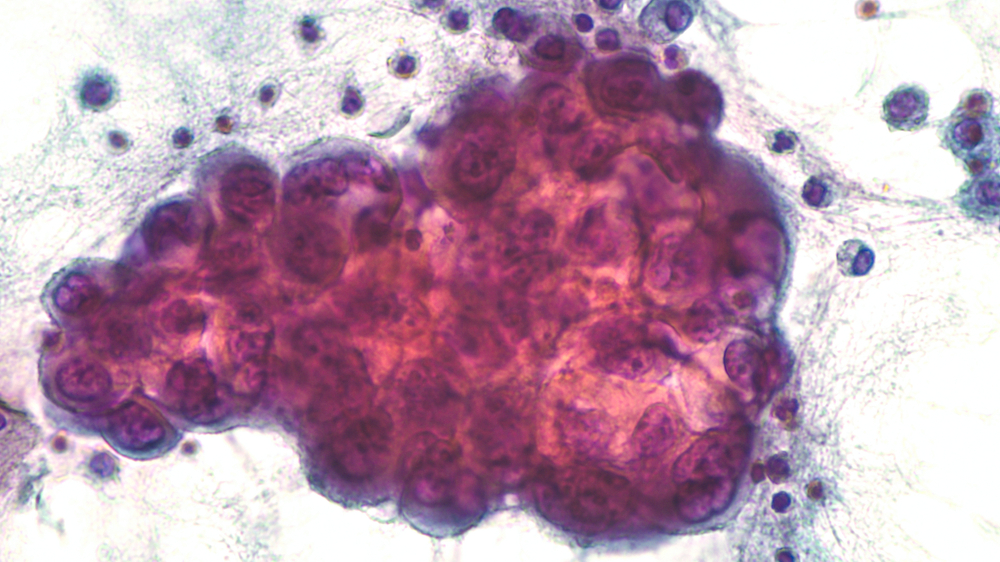
Pleural fluid pathology (cytology) of lung (pulmonary) adenocarcinoma, a type of non small cell cancer (carcinoma). Pap stain.
Bristol-Myers Squibb Co., announced that the ongoing Phase 3 CheckMate -227 study met its co-primary endpoint of progression-free survival (PFS) with the Opdivo (nivolumab) plus Yervoy (ipilimumab) combination versus chemotherapy in first-line advanced non-small cell lung cancer (NSCLC) patients whose tumors have high (≥10 mutations/megabase, mut/mb) tumor mutation burden (TMB), regardless of PD-L1 expression. In the study, TMB was evaluated using Foundation Medicine’s (Nasdaq: FMI) analytically validated assay FoundationOne CDx. Additionally, based on an interim analysis for overall survival (OS), the Data Monitoring Committee recommended that the study continue. The safety profile was consistent with previously reported findings in first-line NSCLC for the combination schedule of Opdivo 3 mg/kg every two weeks and low-dose Yervoy (1 mg/kg) every six weeks.
“TMB has emerged as an important biomarker for the activity of immunotherapy. For the first time, this Phase 3 study shows superior PFS with first-line combination immunotherapy in a predefined population of NSCLC patients with high TMB,” said Matthew D. Hellmann, M.D., study investigator and medical oncologist at Memorial Sloan Kettering Cancer Center. “CheckMate -227 showed that TMB is an important, independent predictive biomarker that can identify a population of first-line NSCLC patients who may benefit from the nivolumab plus ipilimumab combination.”
Giovanni Caforio, M.D., chairman and chief executive officer, Bristol-Myers Squibb, commented, “We believe these data from CheckMate -227 are a breakthrough in cancer research and a meaningful step forward in determining which first-line lung cancer patients may benefit most from the combination of Opdivo and Yervoy. These findings attest to our deep understanding of cancer biology, leading translational medicine capabilities and commitment to developing new approaches for cancer patients.”
About CheckMate -227
CheckMate -227 is an open-label Phase 3 trial with more than 2,500 patients randomized across non-squamous and squamous histologies, evaluating Opdivo-based regimens versus platinum-doublet chemotherapy in patients with first-line advanced non-small cell lung cancer (NSCLC). This large program is comprised of three parts – Parts 1a and 1b and Part 2.
Part 1a is evaluating Opdivo plus Yervoy and Opdivo monotherapy versus chemotherapy in patients whose tumors express PD-L1. Part 1b evaluated Opdivo plus Yervoy and Opdivo plus chemotherapy versus chemotherapy in patients whose tumors do not express PD-L1. PD-L1 expression levels were assessed using the Dako-developed diagnostic PD-L1 IHC 28-8 pharmDx.
Today’s announcement is based on an analysis of patients from the Opdivo plus Yervoy arms and chemotherapy arms across all of Part 1. There are two co-primary endpoints in Part 1 for the Opdivo plus Yervoy combination: overall survival (OS) in patients whose tumors express PD-L1 (assessed in patients enrolled in Part 1a) and progression-free survival (PFS) in patients with high tumor mutation burden (TMB), regardless of PD-L1 expression (assessed in patients enrolled across Parts 1a and 1b). Approximately 45% of the TMB-evaluable patients had tumors that expressed high (≥10 mut/mb) TMB in the study. BMS has an ongoing collaboration with Foundation Medicine and will continue the partnership to seek regulatory approval for the FoundationOne CDx as a companion diagnostic to assess TMB for the potential indication of Opdivo plus Yervoy in first-line NSCLC.
Part 2 is evaluating Opdivo plus chemotherapy versus chemotherapy in a broad population with a primary endpoint of OS.
Opdivo and Yervoy are dosed as follows in the study: Opdivo 3 mg/kg every two weeks with low-dose Yervoy (1 mg/kg) every six weeks.
Filed Under: Drug Discovery




